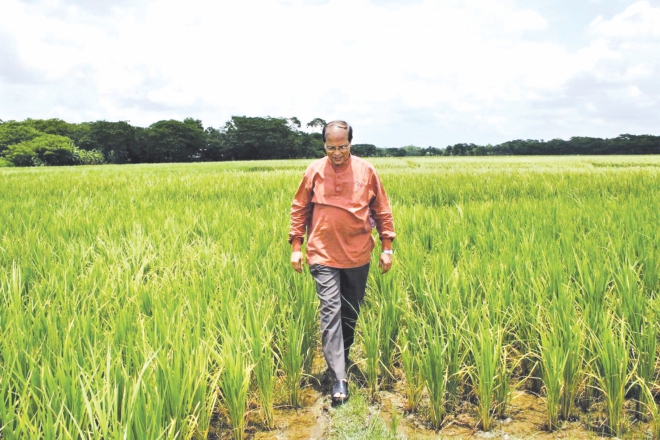BB chief pledges to work more for the underserved

If one has to pick the highlight of Atiur Rahman's tenure as Bangladesh Bank governor, it would undoubtedly have to be his drive for financial inclusion.
In 2009, when he took the helm of the central bank, there was not even one single taka given as agriculture loans by the private and foreign banks.
The same was also true for the small and medium enterprises sector, where promises were aplenty but nothing of note came through.
Now, half of the farm loans are disbursed by private and foreign banks and 29 percent of all loans are going to the SMEs.
“This is something we could not even dream in the past—the central bank has been able to change the mindset of the bankers,” Rahman said as he steps into his sixth year today as the BB governor.
Due to banks' serious involvement in agriculture and SMEs, domestic demand has gone up significantly, helping the country avoid the onslaught of global financial crisis.
They also played a hand in maintaining a steady economic growth not seen in many countries, he said in an interview.
Looking back on how he has fared in the last five years, Rahman said he does not want to highlight how much he succeeded.
“Bangladesh Bank has introduced a landmark payment system—we have fully digitised the payment system. We have introduced automated clearing house in the central bank. We have fully digitised the central bank and the private banks. Funds are being transferred electronically immediately.”
As a result, a large number of e-commerce sites have mushroomed in recent times.
The central has also launched mobile banking services platform, with Tk 250 crore changing hands everyday.
“Every bank is getting into it. Electronic fund transfer has been introduced. National payment switch has been launched.”
BB also launched school banking as part of the broader financial inclusion that will integrate the largely unserved and unbanked populace to the mainstream financial sector. “We have penetrated areas where banks have never set their foot in.”
The asset of the banking sector in proportion to the GDP was $107 billion in 2012. It has now surpassed at least $125 billion.
Five years ago, the foreign currency reserves of the country were about $6 billion, which could barely meet the country's three months of imports. Now, the reserves have surpassed the $20 billion mark, enough to cover imports expenditure for 6.5 months.
The central bank plans to introduce Real Time Gross Settlement, an online system for settling transactions of financial institutions, especially banks.
Rahman said the central bank's green banking effort is being praised across the world, with many calling it the “green central bank”.
He also said the country's monetary policy is one of the best crafted in the world.
“We do it in a participatory way. We discuss with all the stakeholders including the entrepreneurs before we announce it. We take into consideration their concerns. No country in the world prepares monetary policy in this way.”
“As a result, we are getting positive outcome. We have financial stability for a long time. We have not faced any financial instability.”
Unfortunately, Rahman also presided over the biggest financial scam in the country's history: the Hall-Mark scam at the state-run Sonali Bank.
He kept calm and brought the situation under control, adding that the financial stability has been strengthened further due to those scams.
“We are more alert now. The supervision has been strengthened and digitised more than ever before.”
The governor has also faced criticisms for his failure to control the scheduled banks and improve their performance.
In reply, he said: “One person can't be 100 percent perfect. I think there should be some wanting so we can strive more and improve.”
“It is true that we could have done a lot better. At the same time, we should not miss the point that we have not achieved less,” he said, adding that no central bank in the world has been able to bring in as many changes to the banking sector as BB has in the last five years.
BB particularly came under strong criticism for its failure to act against allegations of corruption at the state-run Basic Bank. But Rahman does not accept the charges.
“Please show me an example where an observer has been installed at any public bank in the country's history. I have sent there a qualified observer. And we have been able to stop the bank's bleeding. We are doing the remaining work.”
The governor also touched upon the issue of corporate social responsibility, which went up after he came to the scene. Last year, the banking sector spent Tk 447 crore, one-third of which was scholarship for poor students.
“There is scope to do more in terms of giving back to the society.”
Traditionally, the governor enjoys autonomy. At the same time, he has to work with a political government, as historically they are appointed by the government.
“The governor of Bangladesh Bank is all in all in making the monetary policy. We never actually discuss the reserve money or broad money or inflation with the government. Our growth forecast sometimes does not go with the government's forecast.”
Rahman said there is no dispute between the government and the central bank, adding that there is, in fact, a very good understanding between the two parties.
About his future plans, the governor said the central bank will accelerate its progress in areas of digitisation and financial inclusion, while not compromising on good governance.
Rahman earns less than 10 percent of what he used to earn from his time as a professor of Dhaka University and other consultancy works. “I am not here to earn money. But I am very, very happy for the opportunity to work for the people.”




Comments